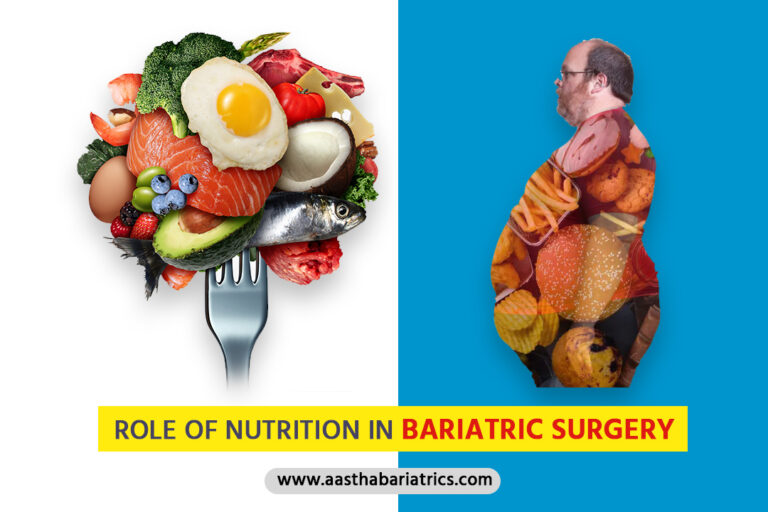Role of Nutrition in Bariatric Surgery - Aastha Bariatrics
Bariatric surgery commonly known as weight loss surgery works by altering the anatomical position of the stomach and small intestine. It is the most effective on-going treatment for obesity and its associated metabolic complications
Nutrition plays a vital role in the management of both pre and post bariatric surgery.

What is the role of nutrition in Bariatric Surgery?
In preoperative patient’s micronutrients deficiency are commonly seen although they exceed the calories intake than the recommended amount. Regardless of high calorie intake the micronutrient deficiencies may be present due to the poor quality of diet and poor lifestyle habits.
In post-operative patients the nutritional demand of the body is high due to the modifications in the stomach. A well-balanced diet with sufficient quantity of macronutrients and micronutrients as per the requirements of the patient is adequate to maintain post-operative phase. If the patient’s nutritional requirements are not met through the diet prescribed then additional supplements are recommended so that the patient is not deprived of any essential nutrients.
Role of Macronutrients in bariatric surgery
Macronutrients like carbohydrates, proteins, fats are all essential for better and faster recovery post Bariatric surgery.
Energy: Adequate energy is required for maintaining normal body functions. Generally, people have wrong assumptions regarding weight loss journey. People think that they will have to starve themselves to lose weight. Thus, obese people start avoiding their meals which is completely a wrong practice. Every individual requires some amount of energy to maintain their normal weight status. All the involuntary functions in the body such as respiration, digestion etc. requires energy. Although, consuming excessive amounts of calories than the required amount leads to obesity. Thus, consuming adequate amounts of well-balanced meals with all the macronutrients and micronutrients in appropriate amounts is suggested.
Protein: The demand of protein in the diet increases as it helps in building new muscles and assists in faster recovery by repairing the muscles. If the patient’s nutritional requirements are not met through the diet prescribed then additional protein supplements are recommended so that the patient is not deprived of any essential amino acids.
Carbohydrates: Carbohydrates are a vital source of energy. Carbohydrates helps to feed the brain, heart, kidneys, and all the important organs and tissues of the body. It helps in the protein sparing action, energy production, energy storage and all the general metabolic process of the body.
Fats: Fats are an essential component of the human cells. Fats are responsible for protecting the vital organs such as heart, kidney, lungs etc. from mechanical shock. There are many neurotransmitters and hormones which require fats as a precursor or cofactors for their functioning. Fat soluble vitamins like Vitamin A, Vitamin D, Vitamin E, Vitamin K require fat for its absorption and digestion.
Fiber: Dietary fiber plays an important role in digestive health. Dietary fiber helps to decrease the colon transit time so that the blood glucose levels are maintained and the nutrients get enough time to travel into the cells. It helps to control the portion size of the meal as fiber has the property to make the person feel satiated. Fiber also helps to maintain the cholesterol level in the range. There are many researches showing the importance of fiber in weight loss.
Probiotics: Probiotics are the good bacteria which keeps the gut healthy. Gut health is very important for normal functioning of the body. Any disturbances in the gut health disrupts the normal body process.
Fluids: Hydration is the key. Water is necessary for all the metabolic processes inside the body. It is important to maintain the body temperature and electrolytes balance.
Micronutrients are vitamins and minerals which are a very important part of nutrition therapy.
Micronutrients help in faster recovery and are cofactor for many metabolic reactions in the body. Prevention of infections is the one major important role of the micronutrients. Vitamins like Vitamin B12, Vitamin B1, Vitamin C, Vitamin A, Vitamin E, Vitamin D, Vitamin K and Minerals such as zinc, iron, calcium are of the major focus. Lack of micronutrients can lead to serious health complications.
What is the Importance of nutrition counseling
Diet therapy also helps to maintain the weight for a long period of time. Dietitians take multiple counseling sessions and explain which type of food to be included and avoided, how to follow the diet, how to make modifications in the diet, how to remain consistent and many more such things which should not be ignored. Appropriate counseling regarding lifestyle modifications and patterns are being done so as to ensure overall health benefits and long-term efficacy
GENERAL RECOMMENDATIONS
- Meals should be consumed in the recommended portion size.
- It is important to follow a regular meal pattern. Consume small frequent meals rather than large meals.
- The gap between two meals however should not exceed 3-4 hours.
- Do not skip meals.
- Vegetables may be prepared with the family meals but the patient’s portion should be removed before extra salt/masala is added.
- Fibre in the diet can be increased in the form of leafy vegetables, raw salad and the fruits (preferably with skin).
- Chew properly. Do not eat in haste.
- Refined flours like Maida and its products like noodles, spaghetti and bread should be restricted.
- Avoid all the outside junk food such as Vadapav, Samosa Pav, Noodles, etc.
- Avoid smoking.
- Avoid carbonated drinks and beverages.
- Avoid alcoholic drinks.
- Exercise daily for at least 30 – 45 minutes.
- Drink at least 3-4 liters of water per day.
Read also; The Cost of Bariatric Surgery in India
Why We Are?
- Asia's Trusted Bariatric Center
- Centre of Excellence
- Patient Trusted Highly Volume Bariatric Center in Mumbai
- EMI, Cashless & Mediclaim Facilities are Available
- Daily Patients Follow-up after Bariatric Surgery
- Patient Support Group Every Month
- Obesity Awareness Program
- Available with Latest Technologies
- 18+ Experience in Weight Loss Bariatric Surgery
- 300+ Weight Loss Diet Plan & Recipes
- Highly Trained & Experienced Bariatric Nutritionist
- Patient WhatsApp Chat Group
- & Many More
Medically reviewed by Dr. Manish Motwani, Bariatric & Metabolic Laparoscopic Bariatric Surgeon — Curated by Ruchika Bachwani







